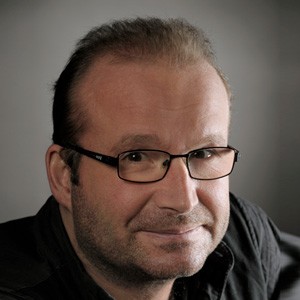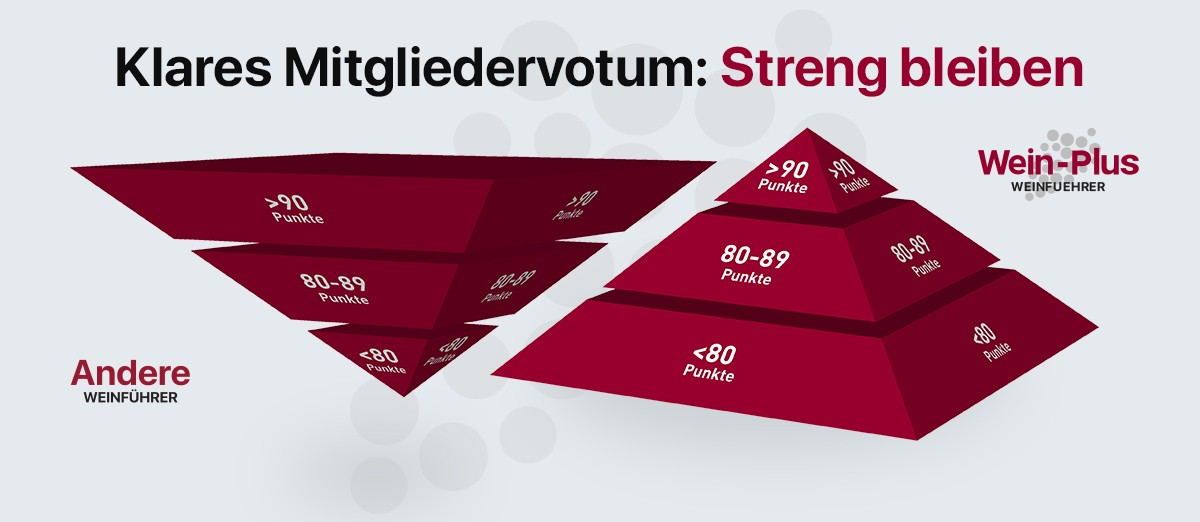 Nobody in Europe tastes more than Marcus Hofschuster. In the 20 years since the founding of Wein-Plus the tasting director has evaluated almost 200,000 wines from all over Europe (as of May 2019). Since the start of Wein-Plus he has been tasting wines five days a week, several hours a day exclusively with blind tasting at always the same workplace and with the same glasses.
Nobody in Europe tastes more than Marcus Hofschuster. In the 20 years since the founding of Wein-Plus the tasting director has evaluated almost 200,000 wines from all over Europe (as of May 2019). Since the start of Wein-Plus he has been tasting wines five days a week, several hours a day exclusively with blind tasting at always the same workplace and with the same glasses.
"Absolute objectivity is hardly possible when tasting wine. Therefore, it is essential for me to work in an environment that makes a neutral evaluation possible, free from influences and disturbances.", Hofschuster explains his philosophy. With this uncompromising attitude and his incorruptibility, Marcus Hofschuster has set standards in Europe: For him, for example, it is unthinkable to taste directly at the wineries or even at trade fairs, as is customary for many tasters of other guides and magazines?.
"I find the winemaker likeable and the landscape great, he has told me interesting stories and looks at me expectantly after tasting. How am I supposed to seriously evaluate a wine then?"he asks.
Hofschuster has been considered one of the most important authorities in European wine criticism for years. For he is one of the few independent tasters in Europe. The website, staff, database, editorial office, service and the elaborate tasting work are financed exclusively by the contributions of the Wein-Plus members. Managing director and owner Utz Graafmann therefore asked them online for their opinion: Should the quality pyramid of wine ratings with only a few top ratings remain at the top? Or should the wine network follow the current trend of the wine media to publish as many high ratings as possible? The background to the survey: of the range of 50 to 100 points that was still common 20 years ago, almost only the top quarter has remained for most evaluators.
"With many wine guides today, a wine below 90 points is considered a disappointment," Graafmann explains the question. Wein-Plus has been using the entire range for 20 years: "This leads to the fact that the ratings of Wein-Plus unfortunately often misunderstood and therefore almost never published by the wineries." 365 members took part in the survey a few days ago. The result was clear: 81 percent of the users answered: "Continue as before". Only 19 percent opted to reverse the rating pyramid.
 |
The reasoned rigour of Marcus Hofschuster is highly appreciated by the Wine Plus members highly appreciated: "In wine, too, the 'always faster, higher, further' has led to an undesirable degradation of wines that are characteristic. The wine market has degraded into a market for bargain hunters (...)", writes one member.
And another user emphasises: "I am very much in favour of keeping the current rating system. I get along well with it, find similar assessments in my tastings, the spread of the rating scale is also sufficient and the classification allows the necessary differentiation. Of course, one could choose a different rating system - but what would be better, what would be gained? The wine would still be the same."
This user is particularly clear: "Personally, I would be happy if you continued to rate as you have done so far. Namely objective and non-partisan AND unpurchasable. As long as you can manage with the subscription contributions, this would be very desirable. Your colleagues from (...) can no longer be taken seriously for a long time...SO FAR!"
"We did everything differently, scored strictly and had to enforce our system against the established media. That took time, money and nerves, but it worked in the end. Now we will educate our users and European wine lovers much more about how a tasting is done professionally and why many point scores are not created in a serious way. We will communicate this difference aggressively", Marcus Hofschuster emphasises.
Glossy magazines are dependent on advertisements, submission fees and "production support" from associations. "There is no other way for them today"says Hofschuster, "but we are independent of these factors - and therefore come to different scores. We owe it to our readers to continue our work in exactly the same way. I couldn't do it any other way."
Wein-Plus has no investors, banks or capital providers in the background who expect high returns. No advertising networks push for click rates or shopping revenues, no publishers demand ad placements. Even for the wineries, rating their wines is free of charge. Because unlike the usual Wein-Plus does not charge tasting fees. For most other wine media and competitions, they have long been part of the business model - sometimes with high amounts.
This raises many questions about the independence of these media. After all, high fees often tend to generate high scores just to secure the participation of estates in the next tasting. The high scores also generate greater reach on social networks, which also raises the profile of the tasters. The business principle works - but not for Wein-Plus. Marcus Hofschuster rates strictly and deliberately does without the free range increase: of the 200,000 wines rated, he has awarded the top score of 100 points only eight times in 20 years. That is 0.004 percent of all wines. 99 points were awarded to 25 wines during this time, and thus 0.012 percent of the test candidates.
Marcus Hofschuster does not award these scores after a one-off, quick tasting as in most competitions. Until he publishes a top score, he tastes the wine again blind several times in the following days in differently composed flights. Until the score is finalised. That, too, is probably unique in Europe.